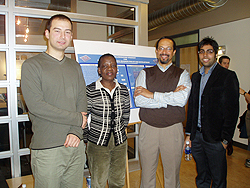Endowed Professorship Recognizes Impact of a Professor, Mentor and Advisor
Bao-Ding “Bob” Cheng’s journey to Syracuse University in pursuit of graduate education in the 1960s was long and arduous. He didn’t have the means for air travel, so he voyaged more than 5,000 nautical miles by boat from his home…


 Researchers at Syracuse University’s
Researchers at Syracuse University’s